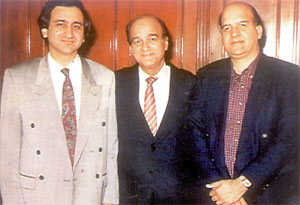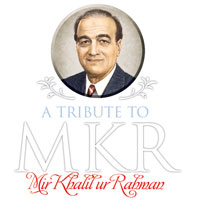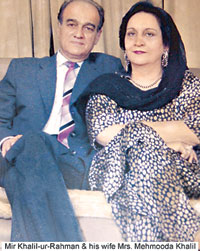MKR: Making of a Media King
By
Wajid Shamsul Hasan
I lately received a call from Sheher Bano, Editor Supplements of The News, from Pakistan. I am constantly on the phone these days talking to friends from home-quite a large number being journalists. Everyone who had been with us in the long democratic struggle was concerned about the fledgling democratic system, facing a ferocious threat by all sorts of characters masquerading as new born democrats, including Muslim version of Elmer Gantry. These characters became more ominous when they had instant support of the last military dictator notwithstanding the fact that their moves were already being choreographed by the hidden hands calling shots for them targeting democracy. We have had the traumatic experience of vitriolic pontifical pronouncements from devils extensively quoting from scriptures that gave a new lease of life to our media doomsayers that had been forecasting since its advent the imminent denouement of our democratic dispensation. Such pronouncements must have been music to their ears, especially, when our popularly elected political leaders were declared: “You’re all sinners... you’ll all burn in hell”.
Thank God, Sheher Bano’s call had nothing to do with all that. No question about the emergence of yet another “Sheikhul Islam” like OBL threatening with demands that would surely lead Pakistan to be yet another Talibanised Afghanistan.
So when Sheher asked me to contribute a piece for the memorial supplement on Late Mir Khalil-ur-Rahman Saheb, since I have had the pleasure and distinction of being one of the editors of his huge chain of publications-nay of having served under him for 28 years-it was so much of relief and honour.
At my age, with a socio-economic, political and media environment that has changed drastically for the worse, persons like me are fond of happily travelling down the memory lane to share with the readers the multifaceted greatness of Mir Saheb-a gentleman larger than life.
After completing my masters in International Relations, I opted to be a journalist to be on the side of those who had decided to oppose Pakistan’s first Martial Law and dictatorship that had ousted democracy “in the national interest.” The only option that I had before me was to join Dawn. Being the son of Syed Shamsul Hasan-first printer/publisher of Dawn, in Delhi, appointed by Quaid-i-Azam Mohammad Ali Jinnah-I had known the iconic Editor of Dawn, Late Altaf Hussain, as a child. I still remember how one evening I barged into his house and introduced myself; Uncle Altaf received me with great affection. When I told him the purpose of my visit, he tried to dissuade me from becoming a journalist; He rather advised me to seek my future in the then prestigious Civil Service of Pakistan. When I kept on insisting, he called me to his office the next day and, lo and behold, I became a journalist!
However, after spending two weeks on the desk, I felt that my seniors were too busy to train me. Just then, I found out that Mir Saheb was launching his first English newspaper. I decided to probe it and called up Mir Saheb right away! Though he did not know my name, for him I was “Chacha Shamsul Hasan’s son”. He asked me about my academic background and the plans I had for future. I told him about Dawn. While not undermining that, he offered me to join Daily News yet to make its debut. I was told to see its Editor Shamim Ahmed and that I did.
Since Shamim Bhai also knew me as a youngster, I was offered the job of an apprentice reporter and I accepted it. We were a young team and those I joined with included S.M. Fazal and Mohammad Jami with a galaxy of seniors, like Khawaja Ibtesam Ahmed, Suleman Minai Sahib, Zamir Niazi Sahib, M.T. Bokhari among many others including Zamir Siddiqi Saheb who, later, became the Editor.
Mir Saheb being a thorough professional, committed to good and independent journalism, never interfered in the working of the newspaper; His editors were by far the most independent. However, as the head of Pakistan’s most expansive growing media chain, he had to face the main brunt of pressures and arm twisting of a dictator, who did not tolerate even legitimate criticism. And Mir Saheb had a team, in Daily News, that was out there to expose the sins of omission and commission of the regime. While he used to tell us to be cautious, he did not discourage dissent. Rather, he stood aloft against all pressures to defend his upright journalists.
Those, who now monopolise freedom of expression as their birth right and often abuse it as a licence, do not know how much Mir Saheb had to suffer and the amount of pressures he had to withstand, along with his team of journalists, to make inroads to break through the then straight jacketed print media. I came to know of his predicaments as the head of Pakistan’s largest media chain when I was appointed Editor of Daily News, after Zamir Bhai’s resignation.
Mir Saheb was responsible for my becoming the youngest editor of a newspaper, though an eveninger yet more powerful and more read than the leading English morningers. Firstly, Mir Saheb nominated me, from Pakistan, for the prestigious Commonwealth Press Union Scholarship for advance training in the United Kingdom. My selection by him-though it was made on merit and professional grounds through all-Pakistan competition-could not have come out had Mir Saheb not been the head of Pakistan’s chapter of CPU.
More or less, every newspaper proprietor had a son/daughter working for him and they tried to put pressure on Mir Saheb for selection. A self-made man that he was who had worked his way up through worst possible trials and tribulations, he would not give in to pressures. To set a personal example, he bypassed his own elder son’s candidature-a legitimate one at that-and short listed me for the CPU scholarship. To train as a CPU journalist was a great learning and training opportunity for me to rise in the profession soon than later. I owe it to Mir Sahib for my second major break as a journalist. As part of the CPU course, I was interning in Bristol Evening Post. For some time I was attached to the Magazine Editor-named King. One day, at lunch, King said, “Hasan, remember my words: Whoever has been trained under my supervision has gone back home as an editor.” I was speechless as my Editor, Zamir Siddiqi, was a highly professional person, healthy and not too old and the Chairman of our group had full confidence in him. Besides, I was just 27-too young to be an editor. King, however, insisted to remember his words.
I was almost through the course, except some months that we had to spend at Oxford’s Queen Elizabeth Hall to write papers, listen to lectures and do case studies. Just then I received a call from Zamir Bhai that he had resigned as the Editor of Daily News because of the pressure from Information Minister, Khawaja Shahabuddin, and Information Secretary, Altaf Gauhar, threatening to close down the entire Jang Group, on account of a headline that Ayub Khan did not like in Daily News. Later, Mir Saheb called me as well and asked me to cut short and return home to take over as the Editor Daily News.
This was just unbelievable! I knew Mir Saheb would have fought back and so would have Zamir Bhai. However, government’s threat to close down the entire Jang Group was too serious. It would have been done and, nearly, a thousand of its employees would have been rendered jobless. The other sinister part of government’s scheme was to rope in Jang Group as the most powerful chain in National Press Trust. And then our judiciary as usual was tied to the apron string of the military dictator. It would not have given any relief to Mir Saheb. Rather, it would have justified the closure of Jang Group which apparently would be in “the best national interest”.
Mir Saheb’s career comprised hard work and nothing but hard work, total dedication and relentless commitment. In fact, it was an inspiration at first sight when I visited Mir Sahib’s office, accompanied by my father, on Elander Road, off Chundrigarh Road. As we went in, we saw him-the man who grew to be the Media King-dusting his office table. It was a lesson for me and I have tried to emulate it ever since.
As the Editor of Daily News, I got great many opportunities to travel with him, with Presidents and Prime Ministers, and otherwise too. I found him to be very humane and humble. He would not be rude and but had the courage to tell even the mightiest how he differed with their policies. It would require a whole book to recount my personal experiences in regards to being Mir Sahib’s blue-eyed Editor, to whom he had given complete freedom despite facing, much more than often, the wrath of the rulers owing to his favourite editor’s “journalistic adventurism” and the daredevil in him.
One day, during General Zia’s time, Mir Saheb called me to his office; I rushed to see him. This was the time when pressures had started affecting his health adversely. He seemed rather overly perturbed. In his profound affection, he mentioned, “Wajid Mian, I received a call from Information Secretary. He told me that General Saheb is very unhappy with your articles and wants me to sack you.” I told him I am sorry for all the trouble caused to him because of me and offered my resignation. He raised his voice-a rare moment-and uttered, “Resign? Yes. It is easier said than done. I won’t have that.” And as he said this, Zia’s ADC was on line to tell him President wanted to speak to him.
Yes. Indeed, a tongue-in-cheek Zia started off with social niceties and Mir Saheb seemed relaxed but then what Zia said must have infuriated him. I heard a loud and clear Mir Saheb tell him, “General Saheb, you don’t know Wajid. Bhutto did not ask me to appoint him in 1962. He joined me as an apprentice and rose to be editor on merit. Yes, he has his own views. He has a right to have them but I cannot ask him to change them. Rather, I respect them and feel morally bound to protect them.” By Mir Sahib’s tenor and temper, Zia, being a clever man, got the message that talking further wont do and, hence, with usual round of niceties, hung up the phone.
Mir Saheb was a father like figure for me; always supporting me. Had he, with his teachings and guidance, not been there, I wouldn’t have been able to be the kind of journalist that I am today. The likes of him are born in centuries and they leave indelible imprints on sands of time which can’t be erased ever.
— Wajid Shamsul Hasan is currently serving as High Commissioner of Pakistan to U.K
|
 |
 |
| |
“I have three sons. One of them is
Javed, the second is Shakeel and
the third is ‘Jang’, which I love like my own son.” |
| |
“I did not have any role model
in my family whose footsteps
I followed to become what
I am today, but my sons have
me as an example.” |
| |
“Freedom of press means to be
able to write freely about the
policies and wrong-doings of the
government without having to
compromise on principles.” |
| |
 |
| |
|

